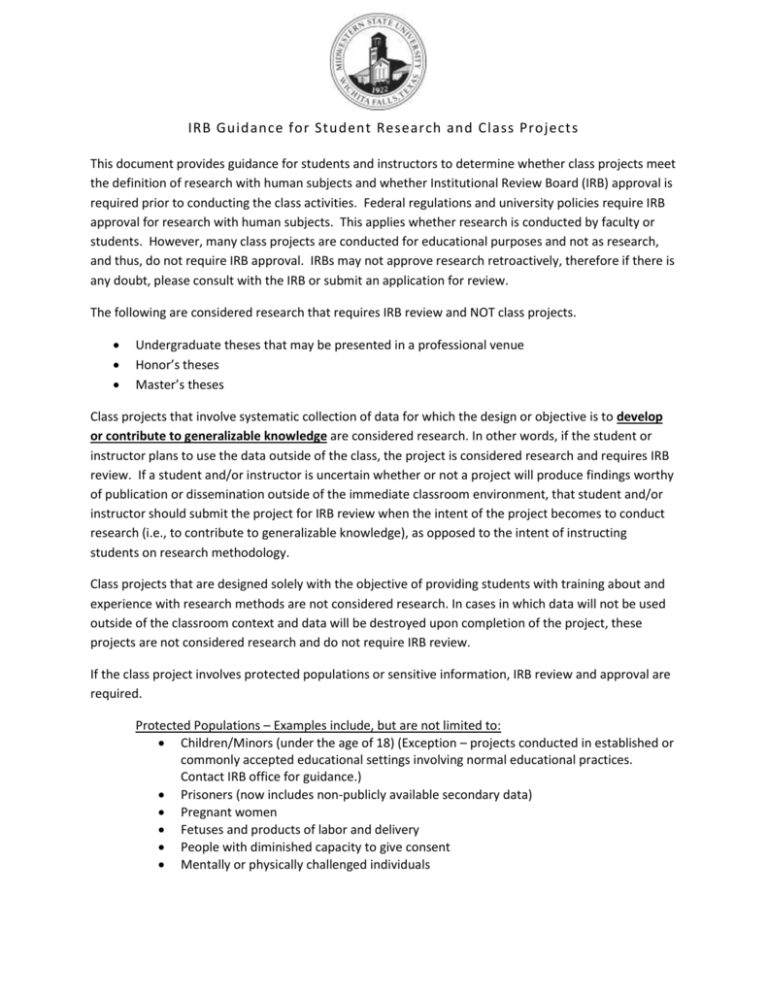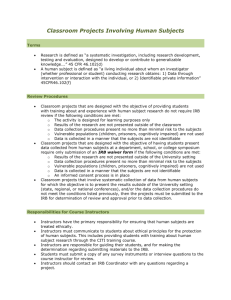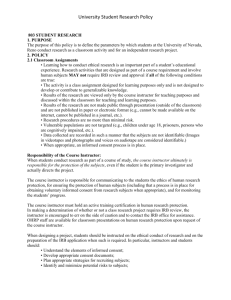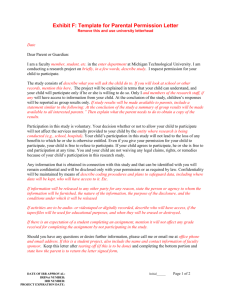IRB Guidance for Student Research and Class Projects This
advertisement

IRB Guidance for Student Research and Class Projects This document provides guidance for students and instructors to determine whether class projects meet the definition of research with human subjects and whether Institutional Review Board (IRB) approval is required prior to conducting the class activities. Federal regulations and university policies require IRB approval for research with human subjects. This applies whether research is conducted by faculty or students. However, many class projects are conducted for educational purposes and not as research, and thus, do not require IRB approval. IRBs may not approve research retroactively, therefore if there is any doubt, please consult with the IRB or submit an application for review. The following are considered research that requires IRB review and NOT class projects. Undergraduate theses that may be presented in a professional venue Honor’s theses Master’s theses Class projects that involve systematic collection of data for which the design or objective is to develop or contribute to generalizable knowledge are considered research. In other words, if the student or instructor plans to use the data outside of the class, the project is considered research and requires IRB review. If a student and/or instructor is uncertain whether or not a project will produce findings worthy of publication or dissemination outside of the immediate classroom environment, that student and/or instructor should submit the project for IRB review when the intent of the project becomes to conduct research (i.e., to contribute to generalizable knowledge), as opposed to the intent of instructing students on research methodology. Class projects that are designed solely with the objective of providing students with training about and experience with research methods are not considered research. In cases in which data will not be used outside of the classroom context and data will be destroyed upon completion of the project, these projects are not considered research and do not require IRB review. If the class project involves protected populations or sensitive information, IRB review and approval are required. Protected Populations – Examples include, but are not limited to: Children/Minors (under the age of 18) (Exception – projects conducted in established or commonly accepted educational settings involving normal educational practices. Contact IRB office for guidance.) Prisoners (now includes non-publicly available secondary data) Pregnant women Fetuses and products of labor and delivery People with diminished capacity to give consent Mentally or physically challenged individuals Sensitive Information – Examples include, but are not limited to: Information relating to an individual’s psychological well being or mental health Information relating to sexual attitudes, preferences, or practices Information relating to the use of alcohol or drugs Information relating to illegal behavior Information that if released could reasonably place the individual at risk of criminal or civil liability or be damaging to the individual’s financial standing, employability, or reputation Information that would normally be recorded in a patient’s medical record and the disclosure could reasonably lead to discrimination, stigmatization, etc. Instructors/students who are unsure of whether a proposed project involves a protected population or sensitive information should contact the IRB Instructors’ Responsibilities Instructors should meet with students as soon as possible and go over these guidelines to determine if the proposed class project could be considered research. If there is even a remote possibility that a class project may fall under the definition of research, instructors are advised to submit a human subjects review application with the student to the IRB. Remember, class projects that involve protected populations or sensitive information (as defined at the end of this document) require IRB review and approval. If the class project meets the definition of research: The instructor should assist the student to prepare the appropriate human subjects review application. The instructor should ensure the student has obtained necessary reviews and signatures prior to submitting the application to the college representative to the IRB. If the class project does not meet the definition of research: It is the responsibility of the instructor to ensure that the student project does not meet the definition of research. It is the responsibility of the instructor to ensure that the class project is conducted according to the ethical standards of the relevant discipline. Remember that from the participant’s viewpoint, giving out personal information does not differ for a class assignment or a research project. Personal information is personal information. Instructors should advise students to identify the project to participants as a class assignment and be sensitive to the personal nature of the obtained information. Labeling the class project as “research” is inaccurate and misleading to participants. Students should inform participants that data will be destroyed after their assignment or class project is completed. Instructors are advised to tell students that data from human subjects should not contain any personal, identifying information whenever possible. All class projects must include informed consent language that closely follows the guidelines. Information on what to include in a consent form/script is described below. For an on-line survey, this would be the first page of the survey or in the email post. The IRB is available to give feedback on any proposed class project not meeting the definition of research, even though the IRB would not officially act on the project. Informed Consent When information is collected for a class project that does not meet the definition of research (as defined by the federal regulations) and does not require approval by the IRB, it is still important to “inform” the participants about the class project, whether posted as an email message or presented verbally in person. Make sure the participant is told: The identity of the student collecting data. (This may not always be necessary, as many students enlist the help of friends or family to collect data for a class project.) They must be at least 18 years of age to participate. It is a class project. (Give a little information, e.g., This is for my business class, I am trying to see if there is a relationship between X and Y.) What they will be asked to do (“I would like to ask you some questions about why you chose to attend this University. If there are any questions you don’t want to answer, it is fine to skip them.”). How long the interview, survey, etc., may take to complete. What will happen to the information collected (“The information will be used to write my paper for the class, and I will give a presentation in class. All of my notes, surveys, etc., will be destroyed when the project is completed.”) If they will be identified: examples: “I will not write your name on my notes”; “Do not write your name on the survey;” “I will not use your name in my paper.” The student’s and instructor’s contact information if they have any questions (provide phone number/email). We would like to acknowledge the use of IRB guidelines on class-related projects from the University of Maine, University of North Carolina, and Saint Louis University. FLOW CHART FOR DECISION MAKING PROCESS Is the project an undergraduate thesis, honor’s thesis, or master’s thesis?? → Yes → IRB review required ↓ No ↓ Is the project solely for a class assignment where data will not be used outside of the classroom context and data are destroyed at the end of the project with no further use? → No → Contact IRB for guidance ↓ Yes ↓ Does the project involve protected populations or the collection of sensitive information? (See examples above.) → No→ IRB review NOT required ↓ Yes ↓ IRB Review Required






